English Words in Action, Group H
(a variety of English words which have developed through history and are currently used in our modern age)
Simply click on this banner (or the following link) and you will be on your way to stimulate your brain for greater word comprehension with quizzes based on some of the words in this unit.
habile (adjective), more habile, most habile
Descriptive of being skilled and creative: Janet's mother was more habile as a writer of children's stories than most authors for the very young readers.
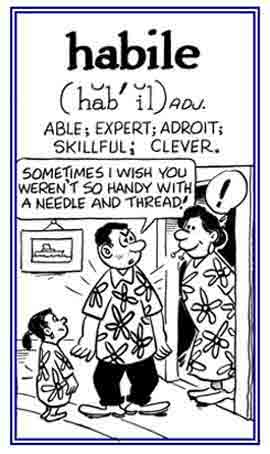
© ALL rights are reserved.
Go to this Word A Day Revisited Index

Go to this Word A Day Revisited Index
so you can see more of Mickey Bach's cartoons.
1. A short violent blow with a sharp tool: Randy took hacks at the tree branch in order to cut it off.
2. A rough cut made by a quick blow with a sharp tool; such as, a notch in a tree made with an ax: The forester made three hacks on the tree to indicate that it was diseased and should be cut down and removed.
3. A coughing noise; making a dry cough: Alan was heard making loud hacks during the night.
4. A wound from being kicked or hit with something: The hack on Fred's leg by a player on the other team was painful.
2. A rough cut made by a quick blow with a sharp tool; such as, a notch in a tree made with an ax: The forester made three hacks on the tree to indicate that it was diseased and should be cut down and removed.
3. A coughing noise; making a dry cough: Alan was heard making loud hacks during the night.
4. A wound from being kicked or hit with something: The hack on Fred's leg by a player on the other team was painful.
Many soccer players get hacks on their shins during the games.
5. An individual who practices a trade or career more for the gains to be achieved than for the professional merit: Leonard was known as a hack in the field of news reporting because he was always striving more for publicity than for the facts.
hack (verb), hacks; hacked; hacking
1. To cut or to chop something by hitting it with short repeated blows using a sharp tool; such as, a knife or an ax: Janine is going out to the garden to hack away at the weeds this afternoon.
2. To cut a path or way through an obstruction; such as, business regulations, undergrowth, or brush: Vincent had to hack his way through some bureaucratic obstacles in order to finally get the project completed.
3. To cut, to shape, or to divide something roughly or carelessly: The editor hacked a big chunk off that article that the reporter wrote for the newspaper.
4. To use a computer or other technological device or system in order to gain unauthorized access to data held by another person or an organization: Earl decided to hack into the accounts of the company so he could illegally transfer funds into an overseas bank.
5. To cough persistently in short dry bursts with a rasping noise: Dina had been hacking so much during the day that she decided to stay home instead of going to the concert and disturbing so many people with her coughing.
6. In sports, to commit a foul by kicking or striking another player on a body part; such as, a leg or an arm: The referee blew the whistle on the player who had hacked a player from the opposing team.
2. To cut a path or way through an obstruction; such as, business regulations, undergrowth, or brush: Vincent had to hack his way through some bureaucratic obstacles in order to finally get the project completed.
3. To cut, to shape, or to divide something roughly or carelessly: The editor hacked a big chunk off that article that the reporter wrote for the newspaper.
4. To use a computer or other technological device or system in order to gain unauthorized access to data held by another person or an organization: Earl decided to hack into the accounts of the company so he could illegally transfer funds into an overseas bank.
5. To cough persistently in short dry bursts with a rasping noise: Dina had been hacking so much during the day that she decided to stay home instead of going to the concert and disturbing so many people with her coughing.
6. In sports, to commit a foul by kicking or striking another player on a body part; such as, a leg or an arm: The referee blew the whistle on the player who had hacked a player from the opposing team.
Those who secretly gain access to computer systems in order to get information, to cause damage, to steal money from accounts, etc.: More and more hackers are creating serious concerns for companies and individuals around the world.
hackneyed (adjective), more hackneyed, most hackneyed
1. Pertaining to something that is not funny nor interesting anymore, because it is used so often that it is worn out and is too commonplace: Sometimes people use hackneyed words, phrases, jokes, or topics to such a degree that they are boring and of little interest for others who have to listen to them.
2. Etymology: A hack, "a taxicab or horse for hire" is a short form of hackney, "a type of horse-drawn carriage" once very frequently used as a taxicab.
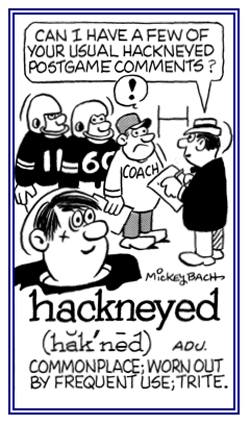
© ALL rights are reserved.
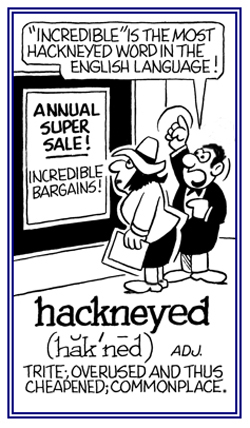
© ALL rights are reserved.
Go to this Word A Day Revisited Index
2. Etymology: A hack, "a taxicab or horse for hire" is a short form of hackney, "a type of horse-drawn carriage" once very frequently used as a taxicab.
The literary hack who does mediocre, or average quality writing, gets his or her name from the "horse", since both could be hired cheaply to do routine or common work.


Go to this Word A Day Revisited Index
so you can see more of Mickey Bach's cartoons.
1. The practice of promoting a political or social agenda; especially, by illegally invading or disabling websites: Shanna's cousin is noted for his social and political hacktivism.
2. The nonviolent use of illegal or legally ambiguous digital tools with the idea of achieving certain political objectives: There are plotters or conspirators among some social activists who describe their activities as hacktivism.
2. The nonviolent use of illegal or legally ambiguous digital tools with the idea of achieving certain political objectives: There are plotters or conspirators among some social activists who describe their activities as hacktivism.
Computer experts who break into systems with the purpose of promoting some kind of activist movement: A group of hacktivists meet regularly and try to devise ways to continue their hacktivism as they target environmental concerns.
haggard (adjective), more haggard, most haggard
Descriptive of someone who looks worn and exhausted from being overworked: Jim's wife was shocked by her husband's haggard appearance after he had been working overtime as a carpenter.

© ALL rights are reserved.
Go to this Word A Day Revisited Index

Go to this Word A Day Revisited Index
so you can see more of Mickey Bach's cartoons.
haggle (verb), haggles; haggled; haggling
To argue or to wrangle about the cost of something: Sharon was haggling with the clerk in the jewelry store about getting a better price for two necklaces.
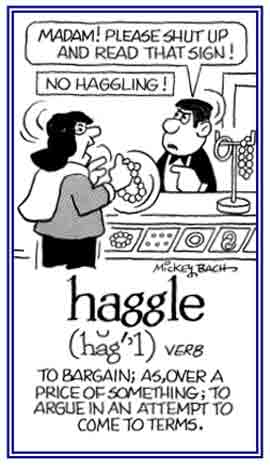
© ALL rights are reserved.
Go to this Word A Day Revisited Index

Go to this Word A Day Revisited Index
so you can see more of Mickey Bach's cartoons.
halcyon (adjective), more halcyon, most halcyon
Descriptive of peacefulness, calmness, prosperity, and of being very happy and successful: Catherine fondly remembers the halcyon days of her career as an actress when she was just out of college.
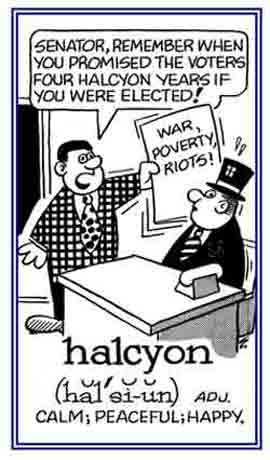
© ALL rights are reserved.
Go to this Word A Day Revisited Index

Go to this Word A Day Revisited Index
so you can see more of Mickey Bach's cartoons.
happen (verb), happens; happened; happening
1. To take place or to occur; especially, without being planned: That kind of accident will happen when driving as fast as Steve usually does.
3. Used to express an angry or forceful statement: Jack said, "Well, Bonita, Louis happens to believe that the politician has been a lousy representative for our district!"
Mother asked, "Jimmy, what happened at school today? Did you happen to learn anything?"
2. To do or to be something by accident or by chance: Adele happened to overhear the doctor and the nurse talking about her accident.3. Used to express an angry or forceful statement: Jack said, "Well, Bonita, Louis happens to believe that the politician has been a lousy representative for our district!"
An occurrence, event, or situation; often used in the plural: There were some odd happenings taking place last night during the storm.
Something that takes place by chance or accident: A happenstance is a combination of "happen" and "circumstance" in which something occurs without any prior planning; for example, "Bill and Margaret met by happenstance in the local restaurant."
happily (adverb), more happily, most happily
1. A reference to saying that something good or fortunate has taken place: Happily, no one was injured in the car accident.
2. Descriptive of being in a willing way: The salesperson told Fred that she would happily accept his credit card for payment of the products that he had picked out.
2. Descriptive of being in a willing way: The salesperson told Fred that she would happily accept his credit card for payment of the products that he had picked out.
A joy that exists for certain situations: Adriana and Brandon found happiness in their years of marriage.
Links to all of the groups of English words in action, Groups A to Z.
You may see the bibliographic list of sources of information for these words in action.

